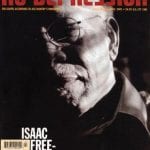Benders – Bent on bluegrass
Bluegrass is about players and characters, a certain place and perhaps even a certain time. For young upstarts like the Benders to come along and ply such singular country fare around the Irish bars and roots-rock clubs of Boston and New England, where the quintet is based, might seem something of a cheek.
“There’s a lot of people who get upset in the bluegrass community, they wouldn’t call us bluegrass,” attests Bow Thayer, 35, the Benders’ singer, banjo player, and primary songwriter. “If we were to show up at a bluegrass festival and start playing our stuff, it would offend because, you know, there’s bluegrass snobs,” he adds with a laugh.
Still, the Benders dress with a certain down-from-the-mountain anti-panache, and have the configuration of a bluegrass band: Upright bass, mandolin, banjo, dobro, guitar. The band’s past, however, reveals some rock skeletons. Thayer cut this teeth playing guitar in punk bands in the early ’90s. He also fronts another band, Bow Thayer & the Euphorians, which, Thayer says, is “a little bit country, more rock ‘n’ roll.”
The Benders’ upright bass player and high tenor harmony singer, Nolan McKelvey, is also in that band. “He’s a session man in big demand,” Thayer says, “because his voice is way up there and he plays real low for that high lonesome bluegrass sound. He lays down the law on string bass.”
McKelvey also plays with mandolinist Sean Staples in the Resophonics, a more traditional bluegrass-based outfit that also includes the Benders’ instrumental star, Tim Kelley, on dobro. Thayer claims Kelley is “better then Jerry Douglas….He doesn’t write any of the songs, but he can just play that dobro and he’s a real show-stopper.”
Finally, there’s singer and guitarist Jabe Beyer, who also fronts the rootsy rock band Jabe and who Thayer calls “a fabulous songwriter” in his own right.
While praising his bandmates, Thayer, who has played banjo for about six years, considers himself the Benders’ weak link as an instrumentalist. “I played fingerpicking guitar so I picked it up pretty quickly, but I still consider myself a hack,” he says. “Having Tim and Sean in the band, I don’t feel self-conscious. I know they can play the hell out of their instruments.”
Thayer moved to his current residence in central Vermont’s beautiful Stowe Valley a few years ago. That is where the Benders formed. “Jabe and Nolan came up one fourth of July and we were just all sitting around on my deck picking. It just kind of jelled,” he recalls. “There’s been some changes; the name didn’t come up right then, but the chemistry did.”
As for that name, Beyer dubbed the band for its bending of genres, mixing old-time string-band and bluegrass sounds with their rock background.
The Benders’ ramshackle self-titled debut CD, released on Boston indie Pig Pile Records in 2000, had plenty of that. Last fall’s The Benders II, though recorded in similar rudimentary live-to-tape fashion in Kelley’s living room with only two mikes, revealed less spit and more polish. Here the playing is more fluid, the songs are warmed by substantial melodies, and the singing a is seductive focal point that could bring bluegrass to a new audience, particularly an urban one.
“What we’re doing is just taking new songs and not getting complicated with the structure,” Thayer offers. “Just taking songs that are relevant to today, and more regional. A lot of the songs I write have to do with New England.”
Thayer is adamant that the last thing the Benders want is to be considered a bogus bluegrass band from Boston, singing about a Kentucky moon. “We take that seriously. We don’t want to be hokey. We’re not a novelty act.”




